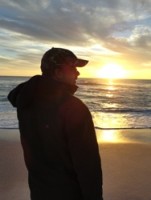
| Campus | Health Education Center |
Directions & Campus Map |
| Location | HE 112A |
| Title | Program Director II |
| Email | Davis.Glenn@spcollege.edu |
| Phone | (727) 341-3680 |
A native of Clearwater (FL), I have been involved in the Emergency Services profession for nearly three decades and part of the fire service for over 20 years, with a little over 13 years as a full-time firefighter/paramedic. I began teaching twenty years ago and have been fortunate to have had the opportunity to teach EMS, Fire Service, healthcare and civilian level courses for a variety of students.
Over the course of a 27 year career I have worked in EMS, Fire Service, and hospital settings whether full-time, part-time or volunteer.
Degrees Earned
I have also completed additional undergraduate and graduate courses in emergency management, fire science, higher education, instructional design, educational psychology, as well as modeling and simulation.
Certifications
Current Memberships
"What we do in life, echoes in eternity." - MDM
"Be an advocate for your patient and an ambassador for your profession." - GD
My philosophy in teaching would echo that of Mr. Larry Lovan,
"My philosophy of teaching is related to my primary function of medical education, specifically, adult paramedic and emergency medical technician students. I believe that people in this profession can have a greater impact on people's lives than any other profession. Unfortunately this can be for better or for worse. So I believe that every student must learn as much as absolutely possible in my classroom, not only technically, but personally and emotionally as well. To do this they must be appropriately motivated to develop their own initiative.
I believe that the only true learning is done on the part of the student; the instructor, after motivating, merely guides or accommodates this process to make it as efficient as possible. My goal is to create a desire on the part of the student to learn and understand all that they can. This requires an open supportive environment that is challenging in a positive way. Any person, and especially students learn most from their mistakes. In medicine the mistakes must be made in the classroom, they must not be made in the work setting. I would hope that a positive classroom environment that allows mistakes, even encourages them by challenging the student to go beyond their present limits would also promote critical thinking, because even though mistakes are intolerable in the work setting, learning must not stop. The stage must be set to continue to learn and improve, but with the basis of knowledge that allows expansion of knowledge by experience rather than by mistake.
To teach or impart knowledge of medicine requires absolutely clear communication of concepts and techniques in a black and white fashion that must effectively be applied in a work environment that is mostly shades of gray. This requires providing a basis of factual knowledge that will give a student the tools to do an effective job. It also must provide the student with the learning motivation to continually strive to attain more information or knowledge and give them the confidence to apply that information creatively and critically to make their impact on patients a positive one. The larger the base of technical knowledge and the greater the freedom in the classroom to make mistakes and develop the thought processes related to problem solving, or critical thinking the better prepared the student will be to meet and succeed in the real world.
I feel that I must give them the attitude and tools to meet life and death and their challenges with confidence and the skills to make a difference. I use humor a great deal in class and in life itself. I would hope to impart to my students a preparation mentally, and emotionally to prepare them for the terrible suffering that is involved in people's lives, who are injured or ill, dead or dying, that they will be directly exposed to in this career field. They must be taught the attitude that even though we are being exposed to the discomfort of this suffering, if we were not there to help, their patients would suffer even more.
We really can make a difference, so we must participate in this suffering, to ease their pain. Humor is a major part of dealing with this suffering. Many times you really do have to laugh because it hurts too much to cry. I also treat all of my students with dignity and respect. They deserve dignity merely for being human beings, but having chosen this career path they are already head and shoulders above the vast majority of students in my mind. They deserve respect for continuing their schooling, as a life long learner myself I count myself among their ranks rather than being above them.
Last and least I may achieve a degree of immortality through teaching. I believe that everyone would like to leave something for future generations. I do as well. If, in the future, my former students recall a concept that helps them successfully respond to another's needs, or use a method of dealing with their feelings or emotions that makes life easier for them, even if they don't remember that they learned it from me, I will have been successful, and if they pass this on to another generation we will have all been more successful."
Larry Lovan, BS, RN, EMT-P, LT/PM SPFR (ret.)
October 2007